Gaming Disorders: Navigating the Fine Line between Entertainment and Addiction—Gaming History, Health Risks, Social Consequences, and Pathways to Prevention
Abstract
1. Introduction
2. History of Games and Video Games
3. Gambling Addiction, Its Impact, and Countermeasures
4. Definitions of and Factors in Gaming Disorder
4.1. Gaming Disorder and Symptoms Recognized by the WHO and APA
- Being hooked on video games;
- Experiencing unpleasant symptoms when stopping video game play;
- Feeling a need to spend more time on video games;
- Inability to manage video game use;
- Losing interest in past hobbies and entertainment other than video games and feeling triggered by video games;
- Continuing to play video games despite awareness of the related psychosocial problems;
- Falsifying the amount of time spent on video games to family members and therapists;
- Using video games to escape or resolve negative emotions;
- Harming or losing relationships and work or educational opportunities because of video game use [35].
- Impaired control over gaming (e.g., onset, frequency, intensity, duration, completion, context);
- Gaming being prioritized over other life interests and daily activities;
- Continuous or increasing gaming despite negative consequences.
4.2. Neurobiological Insights and Psychological Motivations behind Gaming Disorder
4.3. Losses Associated with Addiction and Gaming Disorder
5. Response of Game Developers and Gaming Groups to Gaming Disorder
5.1. Social Responses to Gaming Disorder
5.2. Countermeasures against Gaming Disorder
5.3. Response of Game Organizations to Gaming Disorder
6. Summary and Conclusions
Author Contributions
Funding
Institutional Review Board Statement
Informed Consent Statement
Data Availability Statement
Acknowledgments
Conflicts of Interest
References
- Picard, M. The foundation of geemu: A brief history of early Japanese video games. Game Stud. 2013, 13. [Google Scholar]
- Nordhaus, W.D. The Progress of Computing. 27 September 2001. Available online: https://papers.ssrn.com/sol3/papers.cfm?abstract_id=285168 (accessed on 24 August 2024).
- ICD-11 for Mortality and Morbidity Statistics (Version: 02/2022). Available online: https://icd.who.int/browse11/l-m/en (accessed on 21 September 2022).
- American Psychiatric Association. Diagnostic and Statistical Manual of Mental Disorders (DSM-5®); American Psychiatric Publishing: Arlington, VA, USA, 2013. [Google Scholar]
- Dolan, M. Gaming Disorder and Video Game Addiction: What to Know. 2019. Available online: https://www.everydayhealth.com/emotional-health/symptoms/what-gaming-disorder/ (accessed on 21 September 2022).
- Sublette, V.A.; Mullan, B. Consequences of play: A systematic review of the effects of online gaming. Int. J. Ment. Health Addict. 2012, 10, 3–23. [Google Scholar] [CrossRef]
- Stevens, M.W.; Dorstyn, D.; Delfabbro, P.H.; King, D.L. Global prevalence of gaming disorder: A systematic review and meta-analysis. Aust. N. Z. J. Psychiatry 2021, 55, 553–568. [Google Scholar] [CrossRef] [PubMed]
- Newman, M.Z. Children of the ‘80s Never Fear: Video Games Did Not Ruin Your Life. 2017. Available online: https://www.smithsonianmag.com/history/children-80s-never-fear-video-games-did-not-ruin-your-life-180963452/ (accessed on 21 September 2022).
- Lal, K. Do Video Games Reduce Stress? (Backed by Research). Available online: https://www.healthygamer.gg/blog/do-video-games-reduce-stress/ (accessed on 21 September 2022).
- Lal, K. How Does Video Game Addiction Affect Families? Available online: https://www.healthygamer.gg/blog/how-does-video-game-addiction-affect-families/ (accessed on 21 September 2022).
- General Association of Computer Entertainment Societies; General Association Japan Online Game Association; General Association Mobile Content Forum & General Association Japan e Sports Federation. In Order to Enjoy Games Reassuringly and Safely. Available online: https://www.cesa.or.jp/uploads/2020/info20200310.pdf (accessed on 21 September 2022).
- Mardon, A. The History of Board Games; Golden Meteorite Press: Edmonton, AB, Canada, 2021. [Google Scholar]
- Robinson, P. Social Ritual and Religion in Ancient Egyptian Board Games. Museum of Gaming Research Centre. 2015. Available online: http://www.museumofgaming.org.uk/papers/ritual_in_egyptian_board_games.pdf (accessed on 21 September 2022).
- Kumar, J.; Herger, M.; Dam, R.F. A Brief History of Games. Interaction Design Foundation. Available online: https://www.interaction-design.org/literature/article/a-brief-history-of-games (accessed on 21 September 2022).
- Brooks, G.; Ellis, T.; Lewis, C. Pachinko: A Japanese addiction? Int. Gambl. Stud. 2008, 8, 193–205. [Google Scholar] [CrossRef]
- Fey, M.A. Charles Fey and San Francisco’s liberty bell slot machine. Calif. Hist. Q. 1975, 54, 57–62. [Google Scholar] [CrossRef]
- Tretkoff, E. October 1958: Physicist invents first video game. APS News 2008, 17, 1–8. [Google Scholar]
- Space Invaders, Arcade Video Game by Taito. 1978. Available online: https://www-arcade--history-com.webpkgcache.com/doc/-/s/www.arcade-history.com/?n=space-invaders&page=detail&id=2537 (accessed on 24 August 2024).
- The Father of the Video Game: The Ralph Baer Prototypes and Electronic Games. Video Game History. Smithsonian Institution. Available online: https://www.si.edu/spotlight/the-father-of-the-video-game-the-ralph-baer-prototypes-and-electronic-games/video-game-history (accessed on 21 September 2022).
- Bedi, J. Ralph Baer: An interactive life. Hum. Behav. Emerg. Technol. 2019, 1, 18–25. [Google Scholar] [CrossRef]
- Fernandez, J.; Shannon, S. A History of Nintendo Architecture. In Proceedings of the Fall 2004 Engr 3410: Computer Architecture Class (ca2004), Franklin w. Olin College of Engineering, 15; 2004. Available online: https://burjcdigital.urjc.es/bitstream/handle/10115/33220/2023-24-FCEE-J-2024-2024042-jc.vargas.2020-MEMORIA.pdf?sequence=-1&isAllowed=y (accessed on 24 August 2024).
- Thorpe, A.; Ma, M.; Oikonomou, A. History and alternative game input methods. In Proceedings of the 2011 16th International Conference on Computer Games (CGAMES), Louisville, KY, USA, 27–30 July 2011; pp. 76–93. Available online: https://www.semanticscholar.org/paper/History-and-alternative-game-input-methods-Thorpe-Ma/2329a89a84da0a1ac6b4260abf6a09fbe2dfbf78 (accessed on 24 August 2024).
- Wagner, E. A Strategic Audit of Nintendo Co., Ltd. Undergraduate Honors Thesis; University of Nebraska-Lincoln: Lincoln, NE, USA, 2019; Available online: https://digitalcommons.unl.edu/cgi/viewcontent.cgi?params=/context/honorstheses/article/1149/&path_info=Nintendo_Strategic_Audit.pdf (accessed on 21 July 2024).
- Beasley, D. The Growth of the Online Gaming Industry Relating to the Internet. Available online: https://www.researchgate.net/publication/2551924_The_growth_of_the_online_gaming_industry_relating_to_the_Internet (accessed on 24 August 2024).
- Wu, J.; Liu, D. The effects of trust and enjoyment on intention to play online games. J. Electron. Commer. Res. 2007, 8, 128–140. Available online: http://www.jecr.org/node/159 (accessed on 21 September 2022).
- Shakoor, F.; Fakhar, A.; Abbas, J. Impact of smartphones usage on the learning behaviour and academic performance of students: Empirical evidence from Pakistan. Int. J. Acad. Res. Bus. Soc. Sci. 2021, 11, 862–881. [Google Scholar] [CrossRef]
- The 2018 Global Game Content Market Increased by about 20% from the Previous Year, and the Domestic Cloud Game Market Is Projected to Exceed 10 Billion Yen in 2022. The Famitsu Game White Paper 2019 Was Published on June 27. Available online: https://www.soumu.go.jp/johotsusintokei/whitepaper/eng/WP2023/pdf/01-chap4.pdf (accessed on 21 September 2022).
- Lischer, S.; Jeannot, E.; Brülisauer, L.; Weber, N.; Khazaal, Y.; Bendahan, S.; Simon, O. Response to the regulation of video games under the youth media protection act: A public health perspective. Int. J. Environ. Res. Public Health 2022, 19, 9320. [Google Scholar] [CrossRef]
- Medeiros, G.C.; Redden, S.A.; Chamberlain, S.R.; Grant, J.E. Gambling disorder: Association between duration of illness, clinical, and neurocognitive variables. J. Behav. Addict. 2017, 6, 194–202. [Google Scholar] [CrossRef] [PubMed][Green Version]
- Welte, J.W.; Barnes, G.M.; Tidwell, M.C.; Hoffman, J.H. The prevalence of problem gambling among US adolescents and young adults: Results from a national survey. J. Gambl. Stud. 2008, 24, 119–133. [Google Scholar] [CrossRef]
- Hofmarcher, T.; Romild, U.; Spångberg, J.; Persson, U.; Håkansson, A. The societal costs of problem gambling in Sweden. BMC Public Health 2020, 20, 1–4. [Google Scholar] [CrossRef] [PubMed]
- Takiguchi, N. Problem gambling in Japan. Electron. J. Contemp. Jpn. Stud. 2011. Available online: https://www.japanesestudies.org.uk/articles/2011/Takiguchi.html (accessed on 24 August 2024).
- Hayano, S.; Dong, R.; Miyata, Y.; Kasuga, S. The study of differences by region and type of gambling on the degree of gambling addiction in Japan. Sci. Rep. 2021, 11, 13102. [Google Scholar] [CrossRef]
- Rash, C.J.; Petry, N.M. Psychological treatments for gambling disorder. Psychol. Res. Behav. Manag. 2014, 7, 285–295. [Google Scholar] [CrossRef] [PubMed]
- Pontes, H.M.; Griffiths, M.D. Measuring DSM-5 internet gaming disorder: Development and validation of a short psychometric scale. Comput. Hum. Behav. 2015, 45, 137–143. [Google Scholar] [CrossRef]
- Addictive Behaviors: Gaming Disorder. Available online: https://www.who.int/news-room/questions-and-answers/item/addictive-behaviours-gaming-disorder (accessed on 21 September 2022).
- Northrup, J.C.; Shumway, S. Gamer widow: A phenomenological study of spouses of online video game addicts. Am. J. Fam. Ther. 2014, 42, 269–281. [Google Scholar] [CrossRef]
- Young, K. Understanding online gaming addiction and treatment issues for adolescents. Am. J. Fam. Ther. 2009, 37, 355–372. [Google Scholar] [CrossRef]
- Bass, P.F., III. Gaming addiction: When going online goes off-kilter. Contemp. Pediatr. 2015, 32, 16–21. [Google Scholar]
- Kuss, D.J. Internet gaming addiction: Current perspectives. Psychol. Res. Behav. Manag. 2013, 6, 125. [Google Scholar] [CrossRef]
- Spekman, M.L.; Konijn, E.A.; Roelofsma, P.H.; Griffiths, M.D. Gaming addiction, definition and measurement: A large-scale empirical study. Comput. Hum. Behav. 2013, 29, 2150–2155. [Google Scholar] [CrossRef][Green Version]
- Meng, Y.; Deng, W.; Wang, H.; Guo, W.; Li, T. The prefrontal dysfunction in individuals with Internet gaming disorder: A meta-analysis of functional magnetic resonance imaging studies. Addict. Biol. 2015, 20, 799–808. [Google Scholar] [CrossRef] [PubMed]
- Wang, Y.; Yin, Y.; Sun, Y.W.; Zhou, Y.; Chen, X.; Ding, W.N.; Wang, W.; Li, W.; Xu, J.R.; Du, Y.S. Decreased prefrontal lobe interhemispheric functional connectivity in adolescents with internet gaming disorder: A primary study using resting-state FMRI. PLoS ONE 2015, 10, e0118733. [Google Scholar] [CrossRef] [PubMed]
- Freeman, C.B. Internet gaming addiction. J. Nurse Pract. 2008, 4, 42–47. [Google Scholar] [CrossRef]
- Hussain, Z.; Griffiths, M.D.; Baguley, T. Online gaming addiction: Classification, prediction and associated risk factors. Addict. Res. Theory 2012, 20, 359–371. [Google Scholar] [CrossRef]
- Vollmer, C.; Randler, C.; Horzum, M.B.; Ayas, T. Computer game addiction in adolescents and its relationship to chronotype and personality. Sage Open 2014, 4, 2158244013518054. [Google Scholar] [CrossRef]
- Jones, C.M.; Scholes, L.; Johnson, D.; Katsikitis, M.; Carras, M.C. Gaming well: Links between videogames and flourishing mental health. Front. Psychol. 2014, 5, 260. [Google Scholar] [CrossRef]
- Wang, H.; Sun, C.T. Game reward systems: Gaming experiences and social meanings. In Proceedings of the DiGRA 2011 Conference: Think Design Play, Hilversum, The Netherlands, 14–17 September 2011; Volume 114. [Google Scholar]
- Lee, C.; Kim, O. Predictors of online game addiction among Korean adolescents. Addict. Res. Theory 2017, 25, 58–66. [Google Scholar] [CrossRef]
- Alexis, I. The Economic Impact of Addiction. Available online: https://www.rehabcenter.net/the-economic-impact-of-addiction/ (accessed on 21 September 2022).
- Goroll, A.H.; Mulley, A.G. Primary Care Medicine: Office Evaluation and Management of the Adult Patient; Lippincott Williams & Wilkins: Philadelphia, PA, USA, 2012. [Google Scholar]
- bizSPA. Charge of 0.2 Million per Month in Sochage, the 25-Year-Old Who Had Collapsed in His Home. The Problem Was Not Just about Borrowing. Available online: https://bizspa.jp/post-227422/ (accessed on 21 September 2022).
- Király, O.; Griffiths, M.D.; King, D.L.; Lee, H.K.; Lee, S.Y.; Bányai, F.; Zsila, Á.; Takacs, Z.K.; Demetrovics, Z. Policy responses to problematic video game use: A systematic review of current measures and future possibilities. J. Behav. Addict. 2018, 7, 503–517. [Google Scholar] [CrossRef]
- Griffiths, M. Online video gaming: What should educational psychologists know? Educ. Psychol. Pract. 2010, 26, 35–40. [Google Scholar] [CrossRef]
- Van Rooij, A.J.; Meerkerk, G.J.; Schoenmakers, T.M.; Griffiths, M.; Van de Mheen, D. Video game addiction and social responsibility. Addict. Res. Theory 2010, 18, 489–493. [Google Scholar] [CrossRef]
- Turel, O.; Mouttapa, M.; Donato, E. Preventing problematic Internet use through video-based interventions: A theoretical model and empirical test. Behav. Inf. Technol. 2015, 34, 349–362. [Google Scholar] [CrossRef]
- Japan: Basic Act on Countermeasures against Gambling Addiction Enacted. 2018. Available online: https://www.loc.gov/item/global-legal-monitor/2018-09-13/japan-basic-act-on-countermeasures-against-gambling-addiction-enacted/ (accessed on 24 August 2024).
- Cemiloglu, D.; Almourad, M.B.; McAlaney, J.; Ali, R. Combatting digital addiction: Current approaches and future directions. Technol. Soc. 2022, 68, 101832. [Google Scholar] [CrossRef]
- ESA Responds to WHO’s Proposed Disorder Classification. 2018. Available online: https://www.theesa.com/news/esa-responds-to-whos-proposed-disorder-classification/ (accessed on 21 September 2022).
- Entertainment Software Association Statement on December 3 Dialogue with World Health Organization. 2019. Available online: https://www.theesa.com/news/entertainment-software-association-statement-on-december-3-dialogue-with-world-health-organization/ (accessed on 21 September 2022).
- Sokolov, A.A.; Collignon, A.; Bieler-Aeschlimann, M. Serious video games and virtual reality for prevention and neurorehabilitation of cognitive decline because of aging and neurodegeneration. Curr. Opin. Neurol. 2020, 33, 239–248. [Google Scholar] [CrossRef] [PubMed]
- Raouafi, S.; Etindele Sosso, F.A. Cyberpsychology: Video games as a perspective for cognitive training. Ment. Health Addict. Res. 2017, 2, 1–2. [Google Scholar]
- Granic, I.; Lobel, A.; Engels, R.C. The benefits of playing video games. Am. Psychol. 2014, 69, 66–78. [Google Scholar] [CrossRef] [PubMed]
- Griffiths, M.D. The therapeutic and health benefits of playing video games. In The Oxford Handbook of Cyberpsychology; Oxford University Press: Oxford, UK, 2019; pp. 485–505. [Google Scholar]
- Nuyens, F.; Kuss, D.J.; Lopez-Fernandez, O.; Griffiths, M.D. The experimental analysis of problematic video gaming and cognitive skills: A systematic review. J. De Thérapie Comport. Et Cogn. 2017, 27, 110–117. [Google Scholar] [CrossRef]
- Interactive Games & Entertainment Association. Digital Australia 2018. Available online: https://igea.net/2017/07/digital-australia-2018-da18/ (accessed on 21 September 2022).
- Kakehi, S. E-sports possibilities. Entertain. Bus. 2017, 43, 16–20. [Google Scholar]
- Chung, T.; Sum, S.; Chan, M.; Lai, E.; Cheng, N. Will esports result in a higher prevalence of problematic gaming? A Rev. Glob. Situation. J. Behav. Addict. 2019, 8, 384–394. [Google Scholar] [CrossRef]
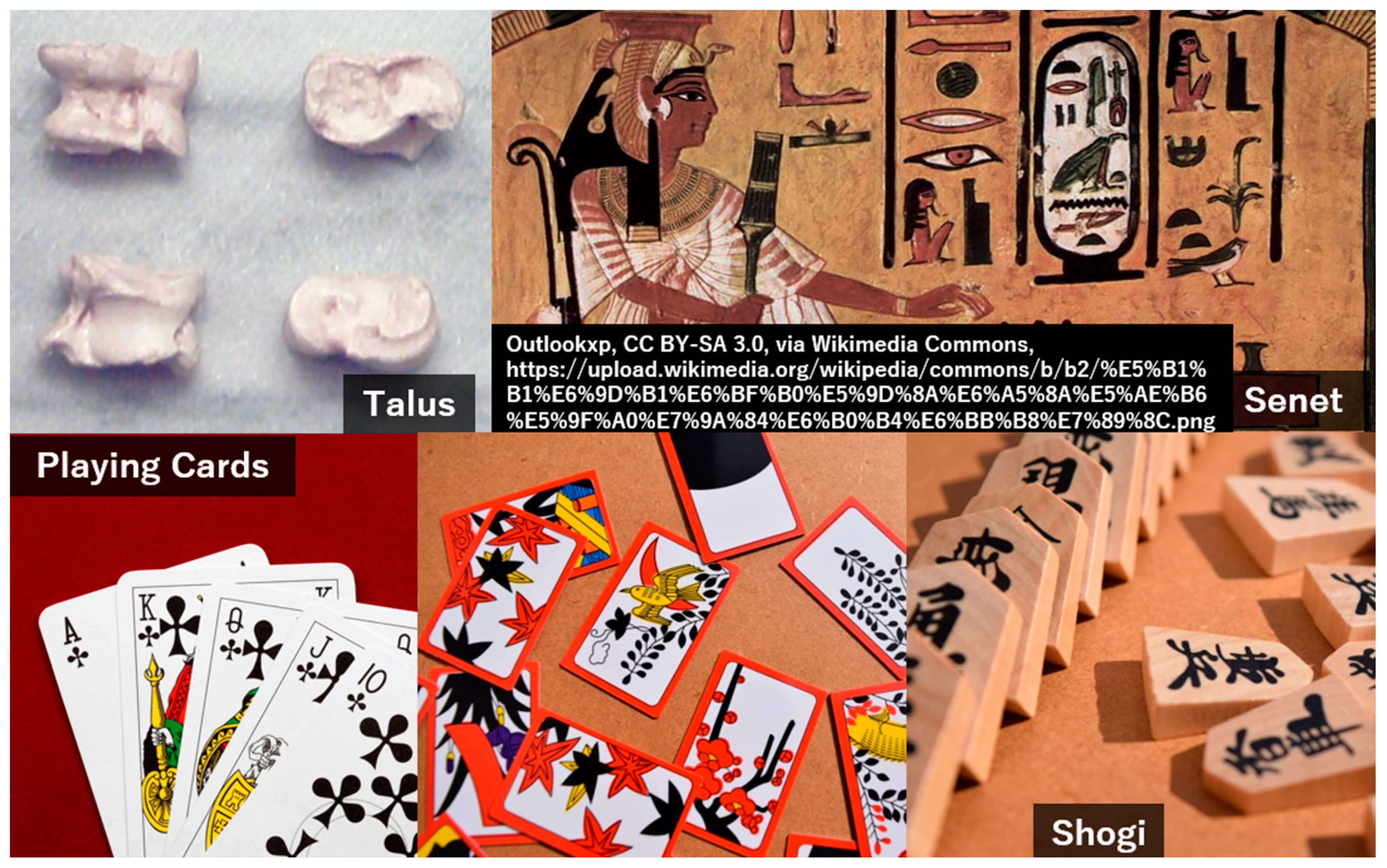
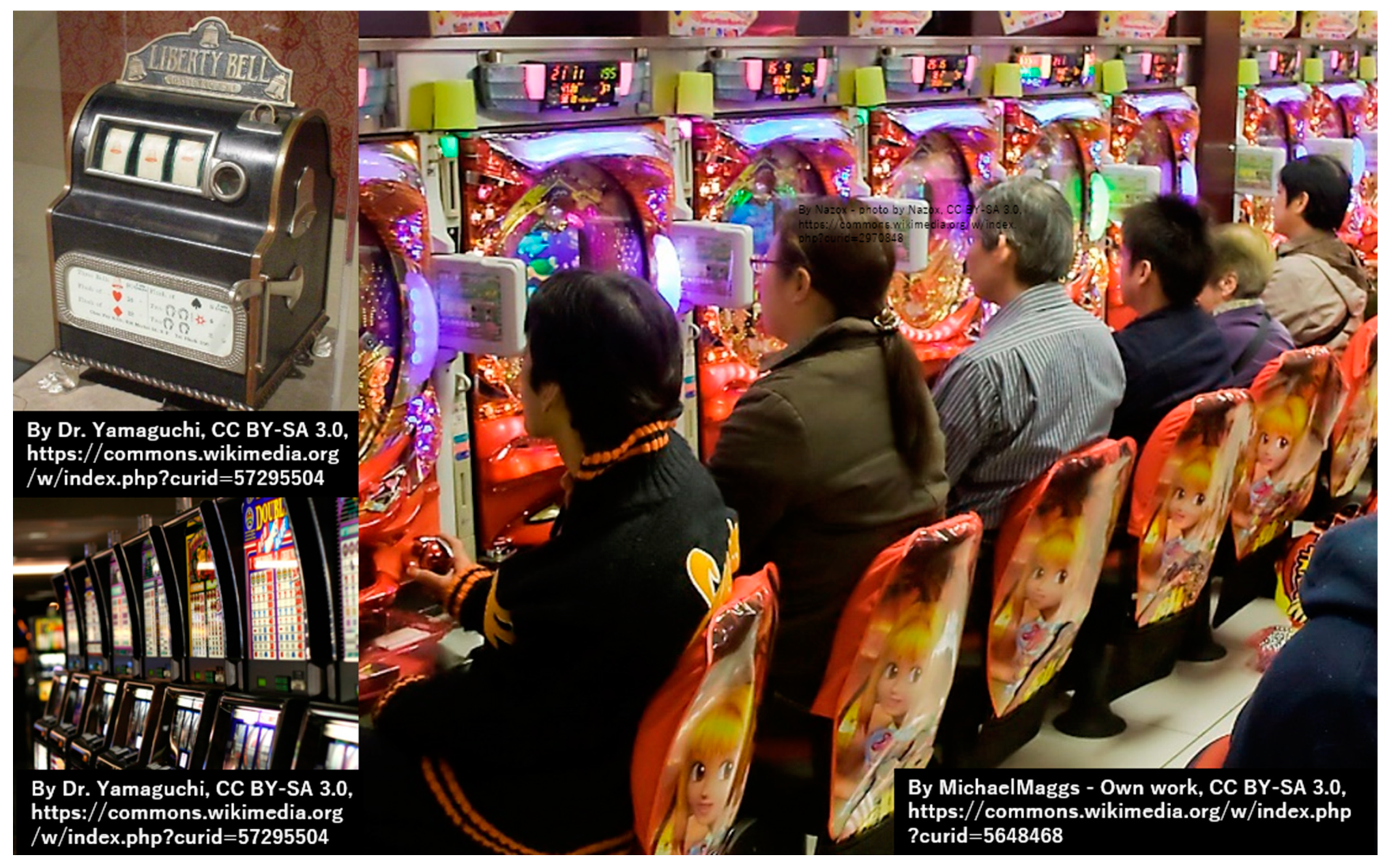
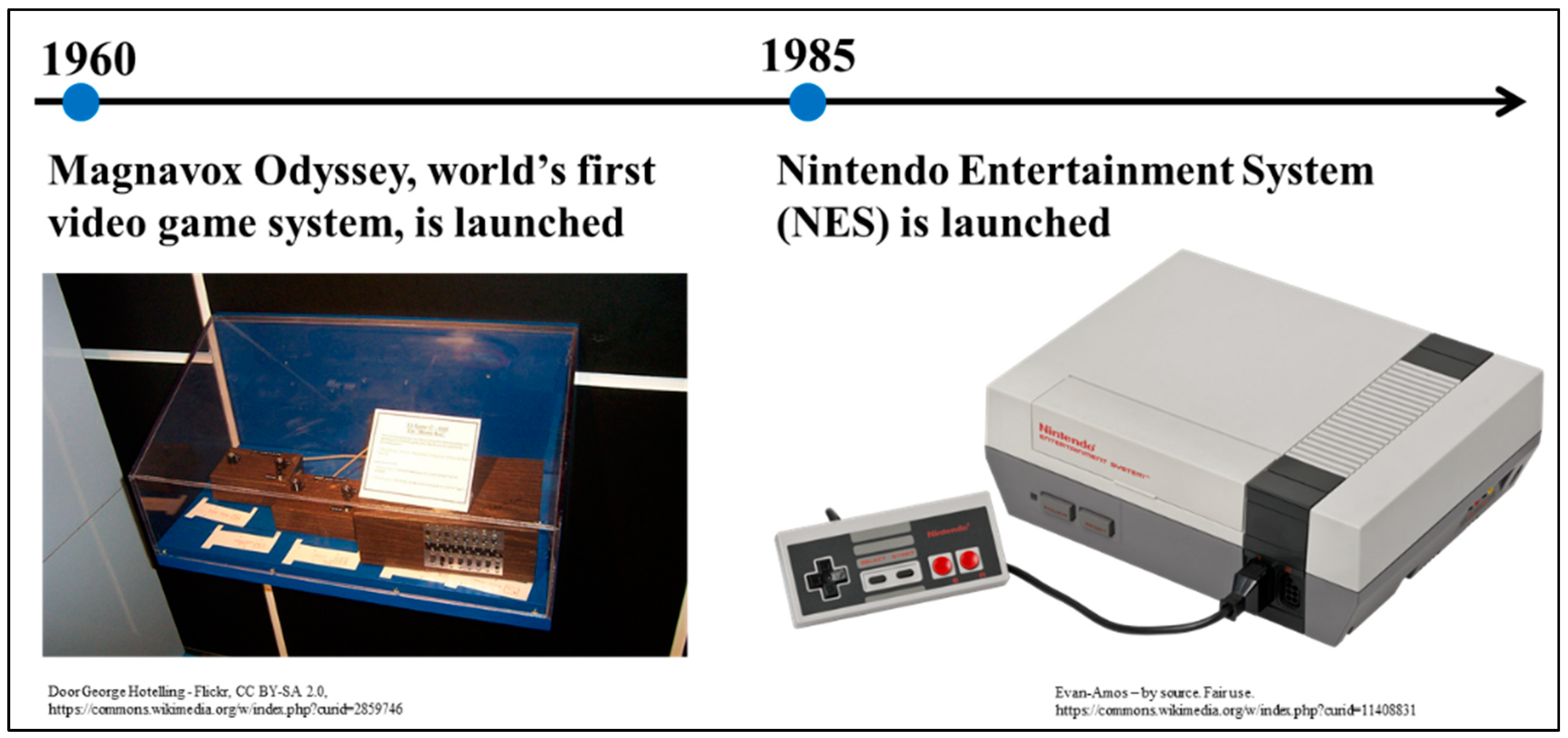
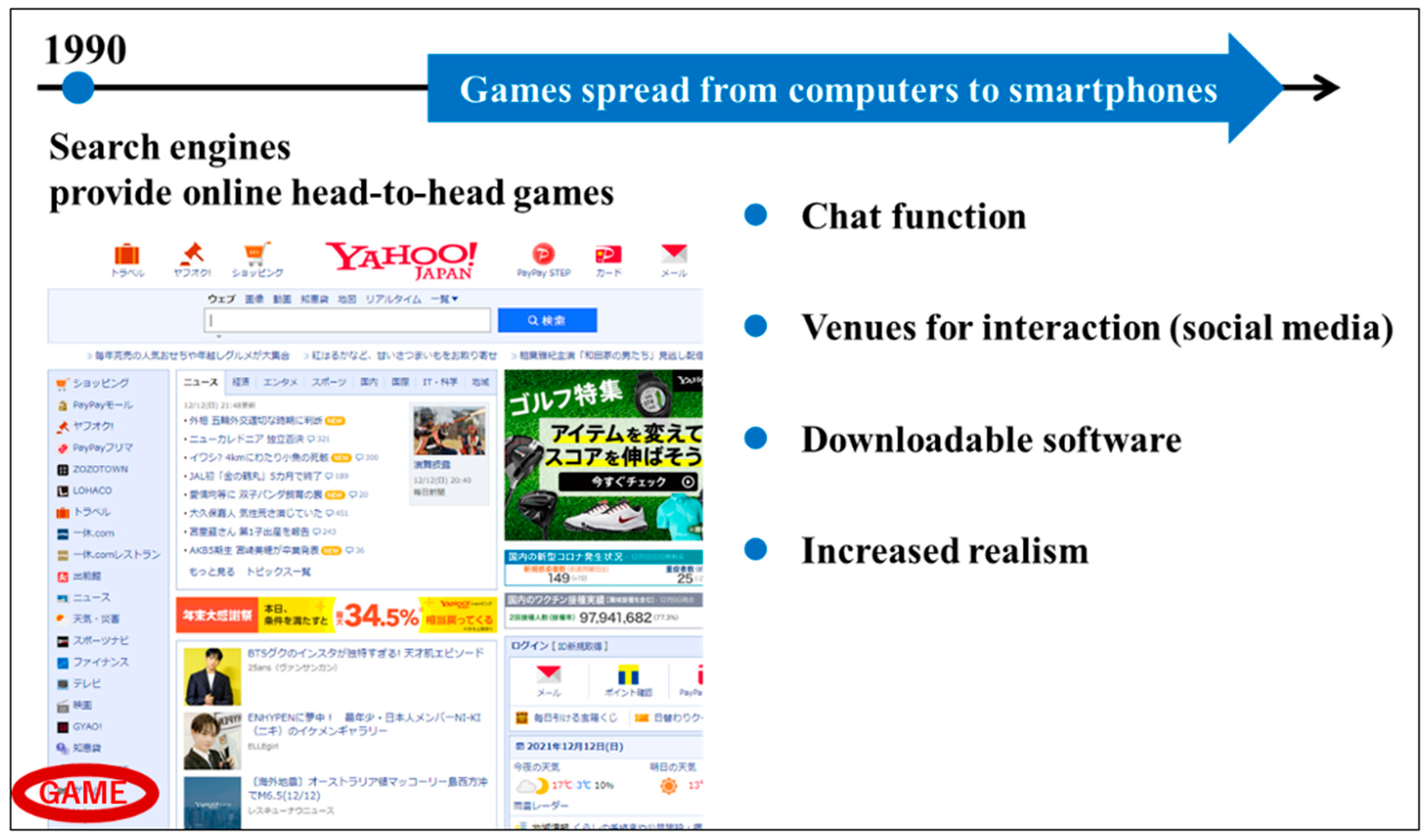
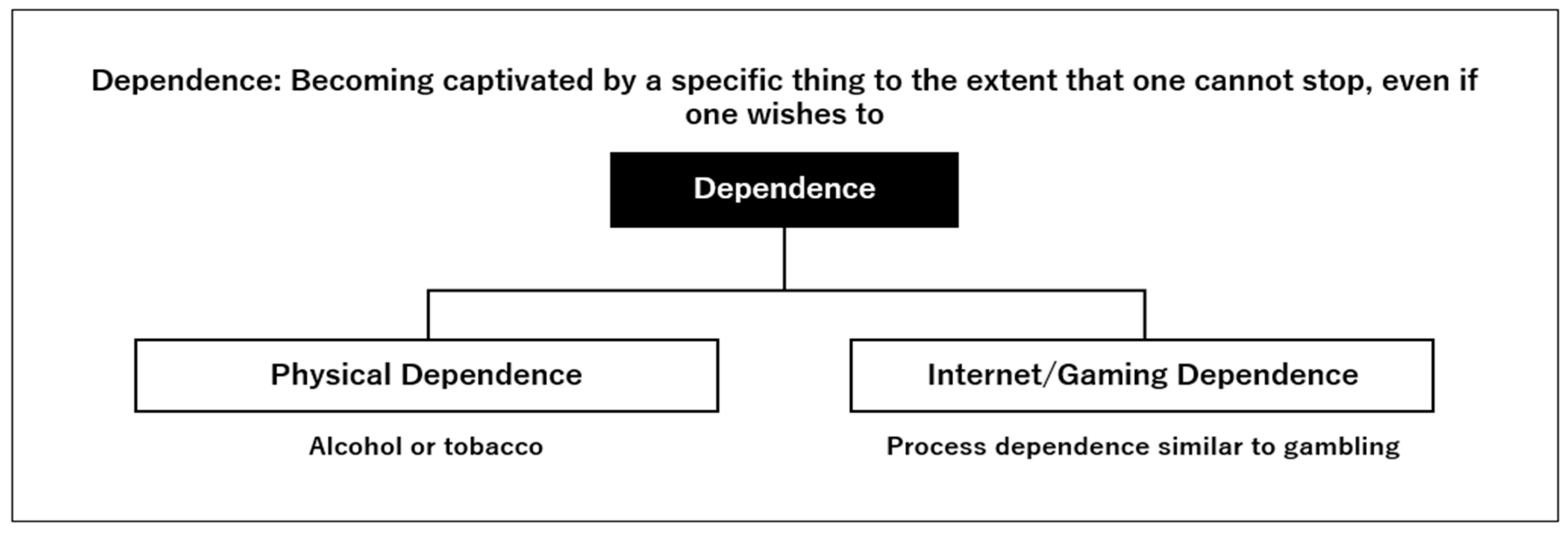
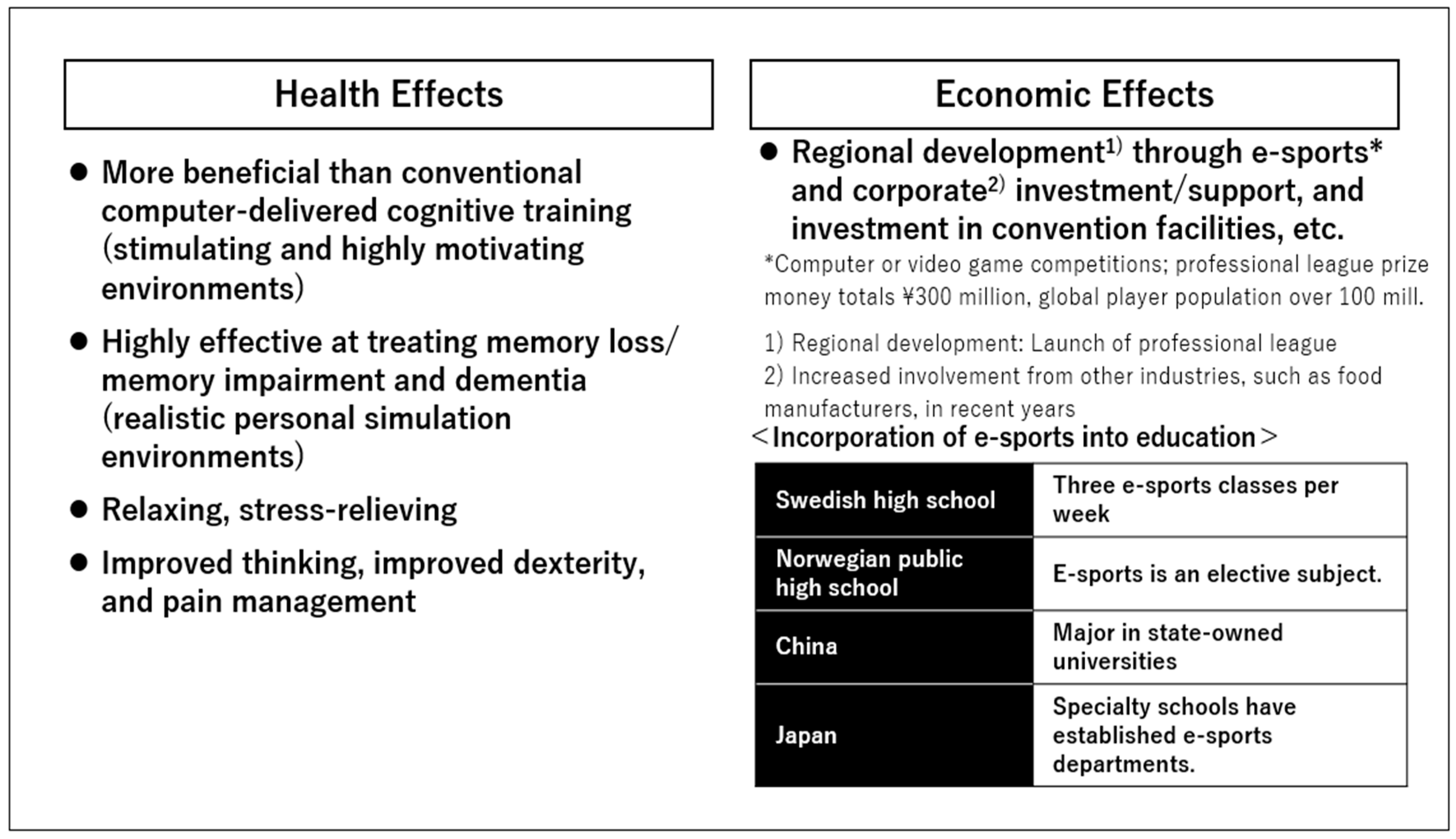
| Historical Period | Relationship between Humans and Games |
|---|---|
| Ancient times | Dice made from ankle bones have been discovered in ancient ruins, and Senet—the prototype of backgammon—was discovered in the tomb of an ancient Egyptian king. |
| Medieval times | Betting in one-on-one games was popular using Western playing cards among the European aristocracy and pieces or cards in Asia. |
| 1850s | The advent of the original type of slot machines brought a dynamic change from ‘man-versus-man’ to ‘man-versus-machine’. |
| 1930s | The calculator, from which computers were derived, was developed in France. |
| 1958 | The original video game, Tennis for Two (William Higinbotham), was born. |
| 1960s | Many engineering researchers studied computers, developing businesses, and games; the world’s first video game system, Magnavox Odyssey, was launched. |
| 1985 | Nintendo launched the Nintendo Entertainment System (NES), which became a huge hit. |
| 1990s | Online games emerged through search engines; the realism of games increased with the ability to download them from the internet and to communicate with others through chat and social networking services. |
| 2008 and beyond | Gaming transitioned from PCs to smartphones; in 2018, the market for online platforms was worth JPY 1.2 trillion (a six-fold increase compared with 2009). |
Disclaimer/Publisher’s Note: The statements, opinions and data contained in all publications are solely those of the individual author(s) and contributor(s) and not of MDPI and/or the editor(s). MDPI and/or the editor(s) disclaim responsibility for any injury to people or property resulting from any ideas, methods, instructions or products referred to in the content. |
© 2024 by the authors. Licensee MDPI, Basel, Switzerland. This article is an open access article distributed under the terms and conditions of the Creative Commons Attribution (CC BY) license (https://creativecommons.org/licenses/by/4.0/).
Share and Cite
Imataka, G.; Izumi, S.; Miyamoto, Y.; Maehashi, A. Gaming Disorders: Navigating the Fine Line between Entertainment and Addiction—Gaming History, Health Risks, Social Consequences, and Pathways to Prevention. J. Clin. Med. 2024, 13, 5122. https://doi.org/10.3390/jcm13175122
Imataka G, Izumi S, Miyamoto Y, Maehashi A. Gaming Disorders: Navigating the Fine Line between Entertainment and Addiction—Gaming History, Health Risks, Social Consequences, and Pathways to Prevention. Journal of Clinical Medicine. 2024; 13(17):5122. https://doi.org/10.3390/jcm13175122
Chicago/Turabian StyleImataka, George, Shu Izumi, Yuji Miyamoto, and Akira Maehashi. 2024. "Gaming Disorders: Navigating the Fine Line between Entertainment and Addiction—Gaming History, Health Risks, Social Consequences, and Pathways to Prevention" Journal of Clinical Medicine 13, no. 17: 5122. https://doi.org/10.3390/jcm13175122
APA StyleImataka, G., Izumi, S., Miyamoto, Y., & Maehashi, A. (2024). Gaming Disorders: Navigating the Fine Line between Entertainment and Addiction—Gaming History, Health Risks, Social Consequences, and Pathways to Prevention. Journal of Clinical Medicine, 13(17), 5122. https://doi.org/10.3390/jcm13175122






